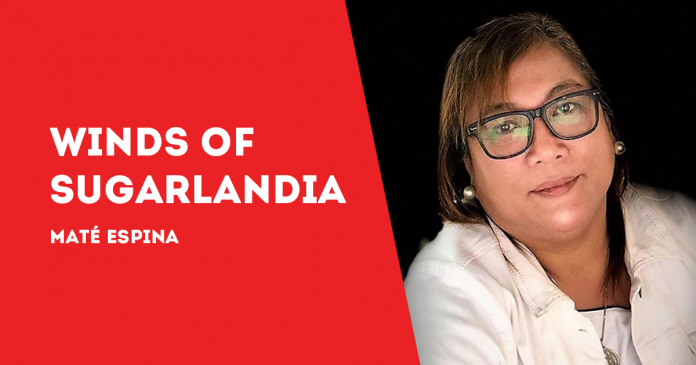
BY MATÉ ESPINA
STORM signal No. 1 is still up in some parts of Negros Occidental but the fear for the typhoon’s wrath has subsided even if there were reported evacuation in some areas over the weekend. Rescue continued Monday morning as water started seeping inside homes and the provincial government continued to call for vigilance.
The flooding and ongoing dredging and river clean-ups all over the province has put focus on the preservation of our environment as well as promoting zero-waste in our communities.
The Bacolod City government recently dredged the Mambulok Creek and it didn’t look like a creek at all but a garbage highway. Tons of garbage were recovered and it was surprising that the owners of Ayala condominiums were able to sell their units when, from the looks of it, the odor coming from the creek that sits behind the facility must have been awful.
Worse is that, this creek must be connected to the main sea as this is just several meters away from the Bredco Port and it quite surprising that it was only recently when the city government acted upon this problem.
I guess this creek is also the culprit in the rising waters at neighboring SM City Mall when rain hits. I have not been near the mall for almost a year now but in the past, whenever it rains, I avoid the mall or hurry out of it because a two-hour continuous shower can flood the parking lot.
Thus, it is good news that a local NGO has launched the “Wala Usik Economy” which adapts the principles of zero-waste and circular economy.
This project is being implemented by the Philippine Reef and Rainforest Conservation Foundation Inc. (PRRCFI) that launched their first zero-waste café in Bacolod in 2019 but because of the pandemic, had to shut it down last year and continued their advocacy online.
With things starting to get back to normal and the opening up of shops and stores, the group is once again amplifying their call for small and medium establishments, especially the tiangges, to go zero-waste.
The PRRCFI is also the group that manages the Danjugan Island off southern Negros that has been declared a marine reserve and has become a haven for divers and training ground for environmental conservation advocates.
I’ve visited Danjugan several times in the past and featured it one time with Sen. Migz Zubiri in tow, discussing conservation plans with founders Gerry Ledesma, Juni Lizares and former EB Magalona Mayor Diding Gamboa.
The zero waste program the group launched is quite interesting and a look-see at the stores (there are 8 today all over the province) is very doable given the right mind set. It involves refilling stations and deposit-return schemes among others.
When one buys rice for example, one has to bring a container as the store owners must adhere to the no-plastic bag policy. If you do not have a container, you can borrow one for a fee and return the same to get your deposit.
Of course it is easier said than done because despite the advocacy to bring your own shopping bags to grocery stores in order to support the no-plastic bag ordinance, I am guilty for always failing to bring one. The least I can do is asked that my stuff be boxed rather than placed in plastic bags.
The group will launch next month innovative ideas to make this concept doable and start-ups of early-stage business concepts will receive prize money and business development support from their partners.
One of their major targets are the tiangges which is very much part of our local economy. You can see a tiangge in just about every corner or street in our community and most of them dispense so many plastic wastes as they retail small amount of goods that are packaged so.
An article about the project highlighted the sale of shampoos in plastic sachets. I do not use that at home but when I travel, I prefer bringing sachets as it is more convenient. How do you advocate for eventually eradicating plastic sachets? Not to mention the popular 3-in-1 coffee sachets.
My late grandmother had a big tiangge in our community then. At that time, plastic containers were not yet in circulation and some of us had to help out pouring cooking oil in ‘lapad’ bottles brought in by costumers. But today, tiangges find it more convenient to just sell these basic commodities in plastic bottles which come in varying sizes as well. Besides, glass bottles are more expensive.
PRRCFI have a lot on their plate in convincing tiangge owners to make some changes. But we have to start somewhere if we care for our environment, if we care for our planet. And it is a welcome relief that we have this group working on this.
At the end of the day, it is really just a question of giving up little inconveniences for the greater good and I plan to join this effort./PN

